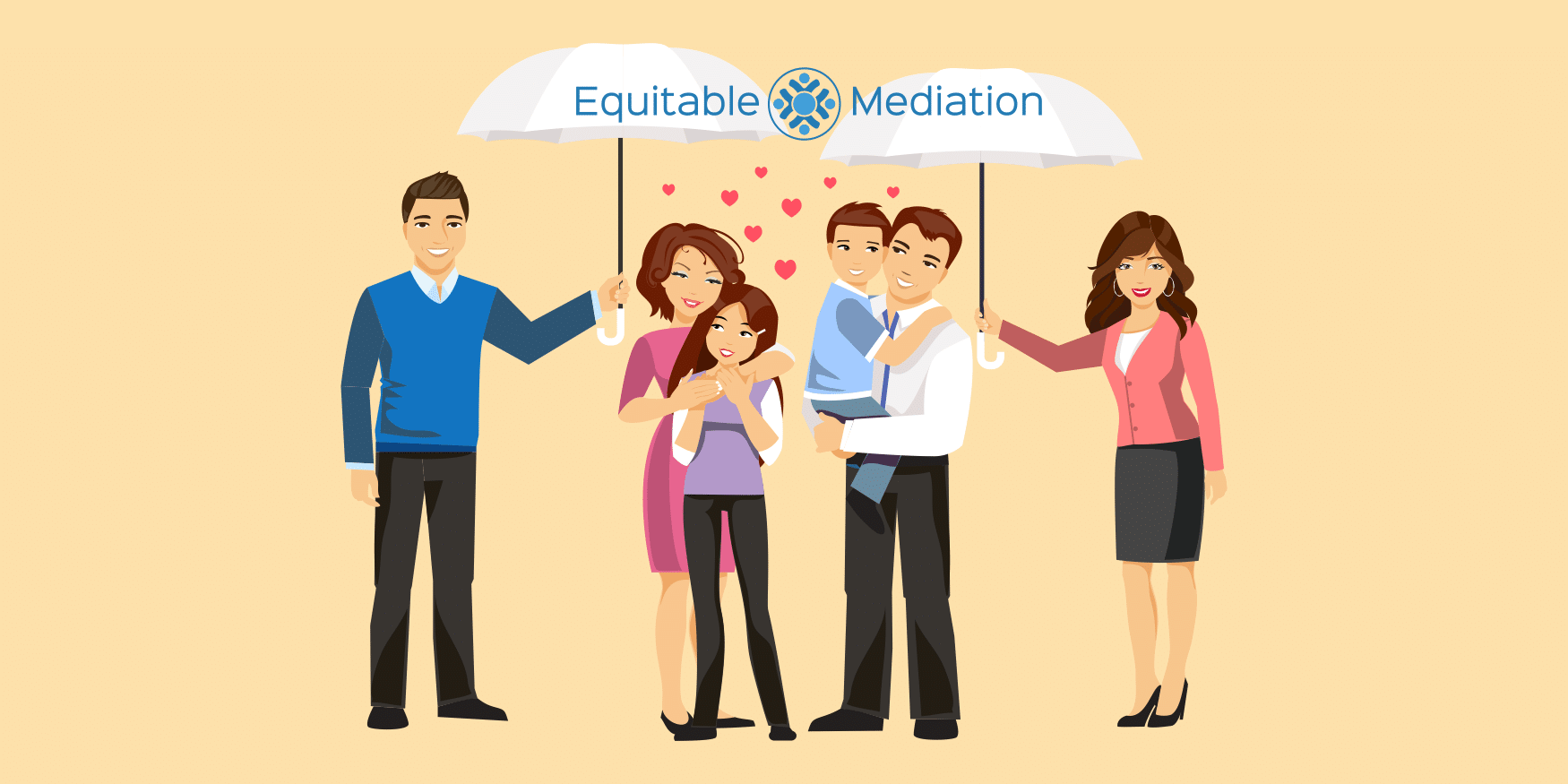Most people think the total cost of divorce mediation is determined solely by the mediator’s hourly rate. And while it might be hard to believe, the hourly rate of the mediator only has some (but not much) bearing on what your divorce mediation cost will ultimately be.
So if it’s not only the hourly rate of the mediator, what other factors should a divorcing couple be concerned about?
How much does mediation cost and what contributes to it?
In addition to the mediator’s hourly rate, there are at least three other factors that contribute to how much your divorce mediation will cost you. They are:
- The competency, skill level, and experience of the mediator;
- The services provided by the divorce mediator;
- The thoroughness of the mediator’s process.
Let’s take a closer look at each of these factors and how each contributes to average divorce mediation cost.
1. The competency, skill level, and experience of the divorce mediator is a factor in the cost of mediation
Divorce mediation is an unregulated profession in the United States. That means anyone can call themselves a mediator. But just because someone calls themself a mediator doesn’t mean they’re competent or qualified to do so. Even with training, or community mediation experience, there’s no guarantee someone will have the experience needed to mediate your case successfully.
What does it take to be a competent and experienced divorce mediator?
There are four characteristics an experienced and competent mediator must possess:
- The ability to expertly guide two divorcing parties through a complex negotiation and ultimately to settlement while remaining neutral at all times;
- The ability to create a series of settlement options for the parties to discuss and consider based on the mediator’s involvement with a variety of other cases similar to theirs;
- A command of the complex financial matters surrounding divorce;
- Comprehensive knowledge of and ability to remain current on the issues that may impact a couple’s divorce settlement.
You’ll rarely find expert mediators like us who practice divorce mediation full-time and possess all of the skills described above. It’s more likely you’ll come across mental health professionals and divorce lawyers claiming to be divorce mediators. But when you take a closer look at what it takes to be a competent mediator for divorce, you’ll see things don’t quite add up.
Mental health professionals aren’t good with numbers
While marriage and family therapists are generally good about remaining neutral, given they’re only mediating a fraction of the time, their experience is slow to come. And most every mental health professional we know has told us they’re not good with the “money stuff” and was actually the reason they stopped attempting to mediate. For the ones who are still mediating, this is bad news for their clients because three of the four matters in divorce directly involve money.
Attorney-mediators have difficulty remaining neutral
While they may have a command of divorce and family law, divorce attorney mediators fall short in two of the four competency areas. The biggest being neutrality. Yet the ability to remain a neutral third party (and not give legal advice) is the number one requirement of being a competent mediator.
And when it comes to creating options and guiding parties towards settlement, they’re usually in the “tell, don’t ask” camp. That’s a big problem since a cornerstone of divorce and family mediation is enabling the parties to control the terms of their marital settlement agreement, not dispensing legal advice or telling them what to do.
What does competency and experience have to do with the cost of divorce mediation?
When not handled properly, you might find yourself facing unexpected legal consequences and agreement oversights that can end up costing you more down the road.
Think about it – what if your mediator lacks the expertise to help you reach a fair agreement? Or if they aren’t truly neutral, offer inappropriate advice, or leave you feeling uncomfortable with your settlement terms?
In these situations, you’d likely need to hire another private mediator to help fix these issues—meaning more time and money spent. In the worst-case scenario, you might even find yourself in the court system potentially facing thousands in legal fees on top of what you’ve already invested in mediation that didn’t work out.
The good news? Working with an experienced, skilled divorce mediator makes all the difference. With the right mediator, you won’t face those extra costs or frustrations because your mediation will succeed and your divorce will be handled properly from the start.
2. Understanding how the differences in divorce mediation services affect the cost of mediation
What do the services provided by the mediator have to do with cost?
Everything a mediator can do “in-house” at the time of your mediation and includes in the cost of mediation services saves you and your spouse money, time, and stress. Here are a few examples.
Support for divorce emotions:
Many mediators don’t offer services to help you deal with the intense anger and sadness that often accompanies divorce. Fail to manage them constructively and there’s a good chance you’ll find yourself in court. Spending hundreds of thousands of dollars and wasting years of your life while you, your spouse and your lawyers battle it out in traditional divorce litigation.
But if you find divorce mediators who are skilled in managing divorce emotions and also have a divorce coach available to you throughout the mediation process, it will provide you with the emotional support you need to make the negotiation phase of mediation more productive and improve your settlement outcome.
The thoroughness of the negotiations:
Some mediators will ask you and your spouse what you want your agreement to look like and they’ll write down whatever you say.
But a mediator that offers a comprehensive private mediation service will:
- Expertly and actively guide you through a series of in-depth negotiations on the issues you and your spouse (and your children) face at the time of your divorce;
- Make sure you discuss and come to agreement on all topics required to peacefully and cost-effectively required to end your marriage – even the ones you’re not aware of;
- Bring to the table a variety of creative options you may not have considered as potential solutions to an issue;
- And “future-proof” your divorce or separation agreement by providing guidance and a framework for what to do when circumstances change.
Working with an expert mediator will eliminate the need for you and your spouse to return to mediation (or worse yet, court) years after your divorce to discuss something that wasn’t covered at the time of your divorce and pay extra court fees.
The drafting of the agreement:
Some mediators prepare a very basic agreement that leaves out specifics. And some only prepare a bulleted list. You would then need to pay a drafting attorney an additional few thousand dollars to rewrite your agreement so its intentions are clear.
But if you hire the right mediator and that mediator is highly skilled, he’ll draft a comprehensive document called a Memorandum of Understanding (MOU) which outlines in great detail all agreements made during your mediation work. This way you and your spouse know exactly what you both agreed to, have a plan to follow when a specific situation that was discussed in a mediation session arises in the future.
3. The divorce mediation process – or lack of one – also contributes to the cost
A mediation process includes a series of forms, worksheets, and systems that, in conjunction with an organized approach to document gathering and negotiation, results in a peaceful, fair, child-focused, thorough, and cost-effective divorce agreement.
Why is a thorough process so critical to keeping costs in line?
The divorce process is very complicated, requires a lot of paperwork, and has a lot of moving parts. Not only that but there will be hundreds of life-changing decisions you and your spouse will need to make. You’ll want to be sure that all of the steps required are covered and carried out in a timely and efficient manner. And completed correctly and in the right order.
A thorough divorce mediation process can go a long way towards making sure all divorce issues are covered properly and in the right order so both divorcing spouses can complete mediation in a timely, productive, and cost-effective fashion.
Some mediators employ very little, if any, process.
They may give you a high-level list of documents to gather or worksheets to fill out and tell you to come back when you’re done. But they won’t tell you where to find these documents or how to complete the worksheets. They may ask you to prepare a budget. Or to do an accounting of your marital assets and liabilities. But again, offer no guidance on what they mean or how to do this.
Some mediators may give you a list of documents to gather and bring to your sessions. They then have you fill out forms and worksheets in session so they can rack up billable hours. Or, they may simply start meeting with you and your spouse without a clear agenda outlining what topics need to be covered in a particular mediation session. Your mediation will take much longer than is necessary and you will have wasted time and incurred additional costs because the mediator didn’t give you the instruction and guidance you needed to have a productive outcome.
On the other hand, working with a mediator who has a thorough process can:
- Ensure you and your spouse correctly complete all needed forms and worksheets and submit all required information the mediator will need to effectively assist you;
- Prepare you both to have a fair and productive negotiation;
- Prevent you from having to return to court in the future to discuss an asset or liability that wasn’t discussed during your divorce negotiations. Or miss out on something you may have been entitled to a share of.
- Help you complete your proceedings in a reasonable period of time instead of letting them drag on forever.
Making your divorce mediation cost-effective, efficient, and productive.
How much does divorce mediation cost? Now you know the real truth!
Now you know there is so much more to the cost of divorce mediation beyond the mediator’s hourly rate. So if you want to fully understand what your divorce mediation costs will ultimately be, you also need to factor in:
- The competency, skill level, and experience of the mediator;
- The scope of services provided by the mediator;
- The thoroughness of the mediator’s process.
Before you hire a mediator for your uncontested divorce based solely on their hourly rate or the low fee they might have quoted you over the phone, do your research and make sure you’re comparing “apples to apples.”
Hire a mediator who is experienced, highly skilled, provides a comprehensive service and has a thorough process.
That’s the only way to ultimately ensure your divorce mediation will be as cost-effective as possible.






